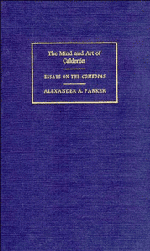Book contents
23 - The court drama
Published online by Cambridge University Press: 05 February 2012
Summary
That Calderón is a predominantly religious dramatist cannot be substantiated statistically, if we limit ourselves to his comedias, or plays for the public theatres and the palace. There are 109 of these plays, only twelve of which have religious subjects; in the remainder religion does not enter at all except in so far as its practice was a natural part of the social world portrayed on the stage; but there are some forty plays that do not portray this social world, and among these there are a group of seventeen in which it is impossible to detect that they were written by a Christian. These are his mythological plays. Calderón could not have written these had he not been an heir to Renaissance Humanism. The classical myths coloured every poet's way of thinking and determined his metaphors. It also invaded the stage, especially in that least realistic of dramatic forms: opera. This had begun in Italy with mythological themes. The first opera, produced in Italy in 1597, had as libretto the myth of Daphne. Orpheus and Cephalus were the subjects of the next two operas, also of course in Italy. Calderón plays an important part in the early stages of the development of opera in Spain: many of his mythological plays are music dramas in whole or in part. Mythology and music, each in its own way, elevated dramatic art well above the sphere of prosaic reality. This was not theatre for the ordinary people, but for an aristocratic élite.
- Type
- Chapter
- Information
- The Mind and Art of CalderónEssays on the Comedias, pp. 329 - 339Publisher: Cambridge University PressPrint publication year: 1989



